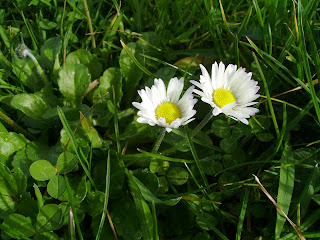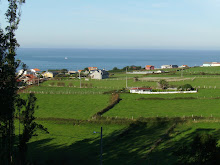Common sow thistle(english)
Cerraja(spanish)
This weed is native to asia and europa,but it is a invasive species in many parts of the world.Simular to sonchus asper but without spines.It is also more common.The name sow thistle refers to pigs liking this weed and also the leaves resemble an pigs ear.Leaves are eatable and very nutrious.They are good in a salad or cooked as spinach.It also has medical uses. From Galicia
Sunday, February 28, 2010
Saturday, February 27, 2010
Hypholoma fasciculare
Sulpher tuft(english)
Hifoloma de laminas verdes(spanish)
This mushroom is very common in europa growing on decaying hardwood. It is not very big about max. 5cm diameter of cap.Normally it groes in clumps in autum and spring.The gills are crowded yellow turning green with age.Sporeprint is purple brown.This is a poisoness mushroom tasting bitter,causing vomiting nausea etc.5 to 10 hours after eating.From Galicia
Hifoloma de laminas verdes(spanish)
This mushroom is very common in europa growing on decaying hardwood. It is not very big about max. 5cm diameter of cap.Normally it groes in clumps in autum and spring.The gills are crowded yellow turning green with age.Sporeprint is purple brown.This is a poisoness mushroom tasting bitter,causing vomiting nausea etc.5 to 10 hours after eating.From Galicia
Friday, February 26, 2010
Bombus terrestris
Buff-tailed bumblebee(english)
Abejorro comun(spanish)
This bumblebee is one of the most common ones in europa.It is also one of the first to emerge after winter.First looking for nectar then a nest site.At the nest site first a resevoir for nectar is built for a ,rainy day, then one for pollen to feed the larvae.In the beginning the queen lays eggs and looks for food,after the workers will look for food and the queen lays only eggs.Workers are know to look for food 13km away from the nest,but normally only a few hundred meter.From Galicia
Abejorro comun(spanish)
This bumblebee is one of the most common ones in europa.It is also one of the first to emerge after winter.First looking for nectar then a nest site.At the nest site first a resevoir for nectar is built for a ,rainy day, then one for pollen to feed the larvae.In the beginning the queen lays eggs and looks for food,after the workers will look for food and the queen lays only eggs.Workers are know to look for food 13km away from the nest,but normally only a few hundred meter.From Galicia
Thursday, February 25, 2010
Ulex europaeus
Common gorse(english)
Tojo(spanish)
This shrub is native to western europa,but is introduced to many country`s in which some it became a pest.Here on the coast you find it every where,also between the planted eucalyptus,where it becomes a fire hazard together with the shedded bast of the tree`s.Ulex europaeus is also withstanding fire.After fire it groes back from the roots and the seeds can also handle a little bit.From Galicia
Wednesday, February 24, 2010
Helix aspersa
Common names Garden snail(english) Caracol comun de jardin(spanish)This snail is very common especially where it has been introduced.It is native to the mediterranean area western europa northwest africa.It eats plant material from fruit trees, vegetables,flowers and cereals.It is a food source for birds,small mammals,lizards,centipeds and other snails.Hibernation(like in the picture)is done by cealing the shell and changing the water levels in the blood after which it can handle -5c.For controling the numbers of this snail there are very bad pesticites,but there are as well other ways to prevent, like cleaning hiding places,putting garlic,skins of orange and copper or collect them for eating as it is a eatable snail.From Galicia
Tuesday, February 23, 2010
Fumaria bastardii
In english a common name is Tall ramping fumitory and in spanish i found one Las batas blancas.Here on the coast i find two colors of this fumaria,white like the picture and pink red.Flower season year round but best in spring and also autum when it is not to hot and dry.It is suppose to have some medical uses like its good for the skin it cleans the blood and kidneys,but it also has a toxic level so you need to know what you are doing.From Galicia
Monday, February 22, 2010
Polydesmus angustus
This millipedes common name in english is Flat-backed millipede.In spanish i can only find ciempies comun,which i think is not correct as it is a millipede.This species is found in northwest europa and is introduced in southeast USA.It lives in compost piles under pieces of wood loose soil etc. where is a lot of leaf litter,roots on which its feed.It is also feeding on fruits especially on strawberries in which you can find them nested in.From Galicia
Sunday, February 21, 2010
Petasites fragrans
Common name in english is Winter heliotrope and in spanish is called sombrererablo.Native to north africa and south europa, now it groes in most of western europa as well.Flower time is from january until march.Known as medicinal plant as well as ornamental plant.From Galicia
Saturday, February 20, 2010
Laccaria fraterna
I cannot really find a common name for this little mushroom,but this is normal for a lot of small or unknown mushrooms.This mushroom is a introduced one from australia probably with Acacia dealbata, but i have not seen this plant yet.It also has a mycorrhizal relationship with Eucalyptus globulus wich groes here in Galicia a lot.This mushroom i found under Globulus.Edibility is unknown,but if so it is to small to be worthwhile.From Galicia
Friday, February 19, 2010
Pararge aegeria
Called Speckled wood in english and in spanish Mariposa de los muros.Normally found in woodlands where it either defends a territory(male)or patroling a grassfield.The,eyes,on the bottom of the wings are probably for predator confusion.The caterpillars are green and feed on a variation of grasses.They either overwinter in pupa or half adult larvea,which gives adult appearance thru the year.From Galicia.
Thursday, February 18, 2010
Laurus nobilis
In english its called Bay laurel in spanish Laurel comun.This evergreen tree groes to 10 18 meters in hight.Famous for its leaves in cooking this aromatic tree is original from the mediterranean region.Now it is found in a lot of places where the climat is simular.The trees are seperated in male or female.On the picture you see the leaves with flower buds wo will develop in flowers and after in 1cm black seeds.Here in Galicia they are common to see.
Wednesday, February 17, 2010
Bombus agrorum
In english this is the Carder bee and in spanish Abejoro comun.Bumblebees are important in the ecosystem for pollunation of various plants.But there is a big decline in numbers even in species because of habitat loss and maybe more because of pesticides.Humans are using them for so called ,buzz polination,not for honey as they dont collect it like honey bees.All in all bumble bees and bees are good for the planeet and humans and something is wrong when are we really gone do something.From Galicia
Tuesday, February 16, 2010
Sonchus asper

This weed is called Cerraja in spanish and in english its called Spiny sow thistle. It normally groes and dies in one season.It groes in fields on roadside and barren land.It is native to europe but now it is pretty commun in america to.When you break the leaves or stem it ,bleeds,a milky juice.Leaves to be said eatible tasting like lettuce.
Monday, February 15, 2010
Limax maximus

In english its called leopard slug ,in spanish babosa leopardo.This slug can grow to about 20cm in lenght.In the day you can find it resting in damp places like under stones,logs.This slug is a night feeder feeding on plant as well as other slugs,it normally stays close to its hidding place.Mating behavior is a little strange they do this hanging from a branche or something else.They both produce eggs because they are both female and male(hermaphrodite)After a month the eggs hatch and then it takes about two years to reach maturity.Limax maximus lives normally about 3 years
Sunday, February 14, 2010
Narciso de manojo Bunch-flowered narcis Narcissus tazzeta

Specially for valentine day some nice flowers.I dont think this kind is a wild flower but narcissen do still grow wild. I guess mostly having a protected status. Cultivated for a long time giving a lot of variations.This ones i found along side of the road up to the house here and they already flower as you can see.Thats why i choose this ones for valentine
Saturday, February 13, 2010
Ortiga muerta Spotted deathnettle Lamium maculatum

This flower indicates rich and damp soils normally flowering from april but here on the coast it already does on protected corners.It flowers normally a few times a year.Reproduction happens underground as well as seed dispersal by ants.It is also a old medice plant because it helps to stop bleeding and helps clean wounds.
Friday, February 12, 2010
Sorrel de madera africana African wood-sorrel Oxalis pes-caprae

This is a invasive flower from south africa witch seems common around here along side of roads and paths.Its flower time is from dec. until may so it give early flower which is nice to have in the winter.It is supposed to taste pleasantly sour, but it is also light toxic affecting the kidneys so i wouldnt put it in a salad.
Thursday, February 11, 2010
Lombrices de tierra Earth worm Lumbricus terrestris

This creature i think everybody seen it; working in a garden or after heavy rain on the streets. A very important animal in the ground helping to compost,opening the structure of the soil and bringing air in with its movement.The faeces can contain 40% more nutrients than surrounding humus.One earthworm can produce 4.5 kilo of this in one year.As for regenerating it can but it has limitations so dont start to cut them al in to too get more.Also soil should not be worked all the time the earthworm will do it for you.
Wednesday, February 10, 2010
Brusela Lesser periwinkle Vinca minor

This plant has flowers almost year round here right on the coast. For the bees an important flower for early energy because it groes on sunny spots where the bee also can warm up. Also for humans a good plant ;good for the blood,brain and arteries.For the garden it covers the ground so weeds dont have space is evergreen and most of the year flowers.All in all a good flower.
Tuesday, February 9, 2010
Monday, February 8, 2010
Hawkmoth cocoon
Sunday, February 7, 2010
Margarita comun Common daisy Bellis perennis
Saturday, February 6, 2010
Primavera,Primrose,Primula Vulgaris
Friday, February 5, 2010
Carabidae Groundbeetle Carabus Melancholicus

i tryed to find commun names for this on the internet but after a while i didnt even know if it was carabus or maybe harpalus i even found some where in the mess of internet it is endemic to spain and portugal so much info but where is the right info i just keep it with this carabus melancholicus europe
Thursday, February 4, 2010
Shield slug Testacella Maugei
Wednesday, February 3, 2010
Bombix de la encina Oak egger Lasiocampus Quercus
Tuesday, February 2, 2010
Violeta de monte Common dog-violet Viola Riviniana
Subscribe to:
Comments (Atom)




























